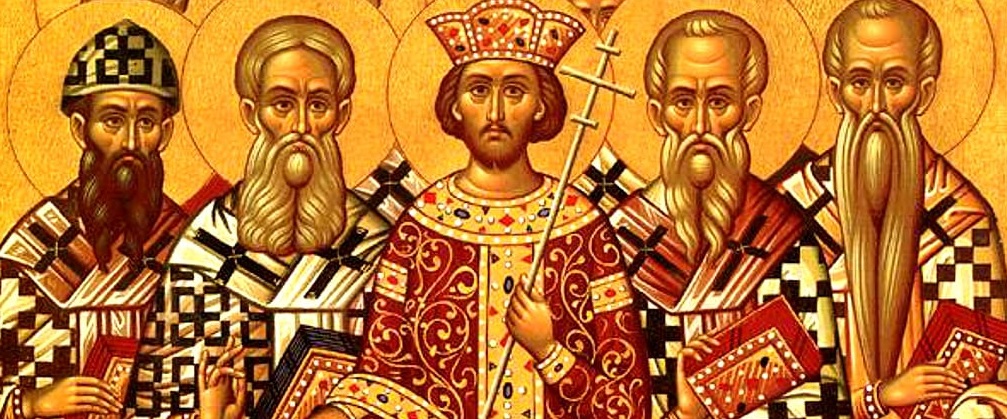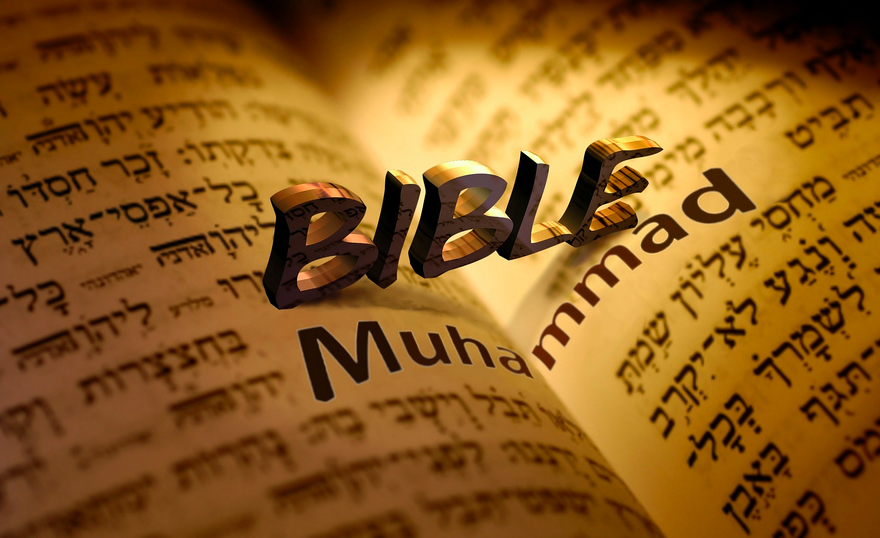It’s become a trend among certain Muslim polemicists to goldmine citations from notable Christian historians in order to mislead people into thinking that the early church fathers, particular the Ante-Nicene writers such as Justin Martyr, Irenaeus, Tertullian etc., were not Trinitarians and did not hold to the ontological equality of the Father, Son and Holy Spirit. One such historian whose work on the early church that is often misrepresented is J. N. D. Kelly. I have therefore decided to cite what Kelly states in respect to the early Apologists’ beliefs on the Trinity, specifically their view of the Person of Christ . All bold and/or capital emphasis will be mine.
Here is what this renowned scholar wrote:
The Apologists were the first to frame an intellectually satisfying explanation of the relation of Christ to God the Father. They were all, as we have seen, ARDENT MONOTHEISTS, determined at all costs NOT TO COMPROMISE THIS FUNDAMENTAL TRUTH. The solution they proposed, reduced to essentials, was that, AS PRE-EXISTENT, Christ was the Father’s THOUGHT OR MIND, and that, as manifested in creation and revelation, He was its EXTRAPOLATION OR statement. In expounding this doctrine they had recourse to the imagery of the divine Logos, or Word, which had been familiar to later Judaism as well as to Stoicism, and which had become a fashionable cliché through the influence of Philo. Others had, of course, anticipated them. In the Fourth Gospel, for example, the Word is declared to have been with God in the beginning and to have become flesh in Christ, while for Ignatius Christ was the Father’s Word issuing from silence. The Apologists’ originality (their thought was more Philonic than Johannine) lay in drawing out the further implications of the Logos idea in order to make plausible the twofold fact of Christ’s pre-temporal oneness with the Father and His manifestation in space and time. In so doing, while using such Old Testament texts as Ps. 33, 6 (‘By the word of the Lord were the heavens made’), they did not hesitate to blend with them the Stoic technical distinctions between the immanent word (logos endiathetos) and the word uttered or expressed (logos prophorikos).
Their teaching appears most clearly in Justin, although his theology is far from being systematic… The Logos, however, had now ‘assumed shape and become a man’ in Jesus Christ; He had become incarnate in His entirety in Him. The Logos is here conceived of as the Father’s INTELLIGENCE OR RATIONAL THOUGHT; but Justin argued that He was not only in name distinct from the Father, as the light is from the sun, but was ‘numerically distinct too’ (kai arithmo heteron). His proof, which he was particularly concerned to develop against Jewish monotheism, was threefold. The Word’s otherness, he thought was implied (a) by the alleged appearances of God in the Old Testament (e.g. to Abraham by the oaks of Mamre), which suggests, that ‘below the Creator of all things, there is ANOTHER Who is, and is called, GOD AND LORD’, since it is inconceivable that ‘the Master and Father of all things should have abandoned all supercelestial affairs and made Himself visible in a minute corner of the world’; (b) by the frequent Old Testament passages (e.g. Gen. I, 26: ‘Let us make man etc.’) which represent God as conversing with ANOTHER, Who is presumably a rational being like Himself; and (c) by the great Wisdom texts, such as Prov. 8, 22ff. (‘The Lord created me a beginning of His ways etc.’), since everyone must agree that the offspring is other than the begetter. So the Logos, ‘having been put forth as an offspring from the Father, was with Him BEFORE ALL CREATURES, and the Father had converse with Him’. And he is DIVINE: ‘being the Word and first-begotten of God, HE IS ALSO GOD’. ‘Thus, then, He is adorable, HE IS GOD’; and ‘we adore and love, next to God, the Logos derived from the increate and ineffable God, seeing that for our sakes He became man’.
The incarnation apart, the special functions of the Logos, according to Justin, are two: to be the Father’s agent in creating and ordering the universe, and to reveal truth to men. As regards to His nature, while other beings are ‘things made’ (poiemata) or creatures (ktismata), the Logos is God’s ‘offspring’ (gennema), His ‘child’ (teknon), and ‘UNIQUE SON’ (ho monogenes); ‘BEFORE ALL CREATURES God begat, in the beginning, a rational power OUT OF HIMSELF’. By this generation, Justin means, not the ultimate origin of the Father’s Logos or reason (this he does not discuss), but His putting forth or emission for the purposes of creation and revelation; and it is conditioned by, and is the result of, an act of the Father’s will. But this generation or emission does not entail ANY SEPARATION BETWEEN THE FATHER AND HIS SON, as the analogy between human reason and its extrapolation in speech makes clear… Elsewhere Justin uses the analogy of the impossibility of distinguishing the light from the sun which is its source in order to argue that ‘this Power is indivisible and inseparable from the Father’, and that His numerical distinction from the Father does not involve any partition of the latter’s essence.
Tatian was a disciple of Justin’s, and like his master spoke of the Logos as existing IN THE FATHER as His rationality and then, by an act of His will, being generated. Like Justin, too, he emphasized the Word’s ESSENTIAL UNITY with the Father, using the same image of light kindled from light. ‘The birth of the Logos involves a distribution (merismon), but NO SEVERANCE (apokopen)…’ At the same time Tatian threw into sharper relief than Justin the contrast between the two successive states of the Logos. Before creation God was ALONE, the Logos BEING IMMANENT IN HIM as His potentiality for creating all things; but at the moment of creation HE LEAPED FORTH FROM THE FATHER as His ‘primordial work’ (ergon prototokon). Once born, being ‘spirit derived from spirit, rationality from rational power’, He served as the Father’s instrument in creating and governing the universe, in particular making men in the divine image.
The teaching of Theophilus of Antioch followed similar lines, although he frankly used Stoic technical terms appropriate to the underlying system of ideas. ‘God’, he wrote, ‘having His Word immanent (endiatheton) in His bowels, engendered Him along with His wisdom, emitting Him before the universe.’ He used this Word as His assistant in His creative work, and by Him He has made all things. This Word is called First Principle because He is the principle and Lord of all things fashioned by Him’. Again, dealing with the sonship of the Logos, he wrote: ‘He is NOT the Son in the sense in which poets and romancers RELATE THE BIRTH OF SONS TO GODS, but rather in the sense in which the truth speaks of the Word as ETERNALLY IMMANENT (endiatheton) IN GOD’S BOSOM. ’ For BEFORE ANYTHING CAME INTO BEING He had Him as His counsellor, HIS OWN INTELLIGENCE AND THOUGHT. But when God willed to create what He had planned, He engendered and brought forth (egennese prophorikon) this Word, the first-begotten of all creation. He did not thereby empty Himself of His Word, but having begotten Him consorts with Him always’. Like Justin, Theophilus regarded the Old Testament theophanies as having been in fact appearances of the Logos. God Himself cannot be contained in space and time, but it was precisely the function of the Word Whom He generated to manifest His mind and will in the created order.
A rather fuller account is given by Athenagoras. In a famous passage, after stating that the unoriginate, eternal and invisible God has created and adorned, and actually governs, the universe by His Word, he goes on to identify the Word as the Son of God. Repudiating the objection THAT THERE IS SOMETHING RIDICULOUS IN GOD’S HAVING A SON, he protests that God’s Son IS NOT LIKE THE CHILDREN OF MEN, but is ‘the Father’s Word IN IDEA AND IN ACTUALIZATION’ (en idea kai energeia). It was by Him, and through Him, that everything was made, and the Father and the Son FORM A UNITY. ‘The Son being IN the Father and the Father IN the Son by the unity and power of the divine spirit, the Son of God is the Father’s INTELLIGENCE and Word (nous kai logos). To make his meaning clearer, Athenagoras then points out that, while He is God’s offspring, HE NEVER ACTUALLY CAME INTO BEING (ouk hos genomenon), ‘for God from the beginning, being eternal intelligence, had His Word (logon) IN HIMSELF, BEING ETERNALLY RATIONAL (aidios logikos). A more correct account would be, that He ‘issued forth’ (proelthon: again the idea of logos prophorikos) into the world of formless matter as the archetypal idea and creative force. In support of this he quotes Prov. 8, 22, ‘The Lord created me as a beginning of His ways for His works’, without stressing, however , the verb ‘created’. In a later chapter he speaks of ‘the true God and the Logos Who derives from Him’, dwelling on the unity and fellowship which exist between Father and Son; and elsewhere he describes the Son as the Father’s ‘intelligence, Word, wisdom’.
There are two points in the Apologists’ teaching which, because of their far-reaching importance, must be heavily underlined, viz. (a) that for all of them the description ‘God the Father‘ connoted not the first Person of the Holy Trinity, but the one Godhead considered as author of whatever exists; and (b) that they all, Athenagoras included, dated the generation of the Logos, and so His eligibility for the title ‘Son’, not from His origination within the Being of the Godhead, BUT FROM HIS EMISSION OR PUTTING FORTH FOR THE PURPOSES OF CREATION, REVELATION AND REDEMPTION. Unless these points are firmly grasped, and their significance appreciated, A COMPLETELY DISTORTED VIEW OF THE APOLOGISTS’ THEOLOGY IS LIABLE TO RESULT. Two stock criticisms of it, for example, are that they failed to distinguish the Logos from the Father until He was required for the work of creation, and that, as a corollary, they were guilty of subordinating the Son to the Father. These objections have a superficial validity in the light of post-Nicene orthodoxy, with its doctrine of the Son’s eternal generation and its fully worked-out conception of hypostases or Persons; but they make no sense in the thought-atmosphere in which the Apologists moved. It is true that they lacked a technical vocabulary adequate for describing eternal distinctions within the Deity; but that they apprehended such distinctions ADMITS OF NO DOUBT. Long BEFORE CREATION, FROM ALL ETERNITY, God had His Word or Logos, for God is essentially rational; and if what later theology recognized as the personality of the Word seems ill defined in their eyes, it is plain that they regarded Him AS ONE WITH WHOM THE FATHER COULD COMMUNE AND TAKE COUNSEL. Later orthodox was to describe His eternal relation to the Father as generation; the fact that the Apologists restricted the term to His emission should not lead one to conclude that they had no awareness of His existence prior to that.Similarly, when Justin spoke of Him as a ‘SECOND GOD’ worshiped ‘in a secondary rank’, and when all the Apologists stressed that His generation or emission resulted from an act of the Father’s will, their object WAS NOT SO MUCH TO SUBORDINATE HIM AS TO SAFEGUARD THE MONOTHEISM WHICH THEY CONSIDERED INDISPENSABLE. The Logos as manifested must necessarily be limited as compared with the Godhead Itself; and it was important to emphasize that there were not two springs of initiative within the Divine Being. That the Logos was ONE IN ESSENCE WITH THE FATHER, inseparable in His fundamental being from Him as much after His generation AS PRIOR TO IT, THE APOLOGISTS WERE NEVER WEARY OF REITERATING. (Kelly, Early Christian Doctrines, revised edition [HarperSan Francisco, 1978], pp. 95-101)



